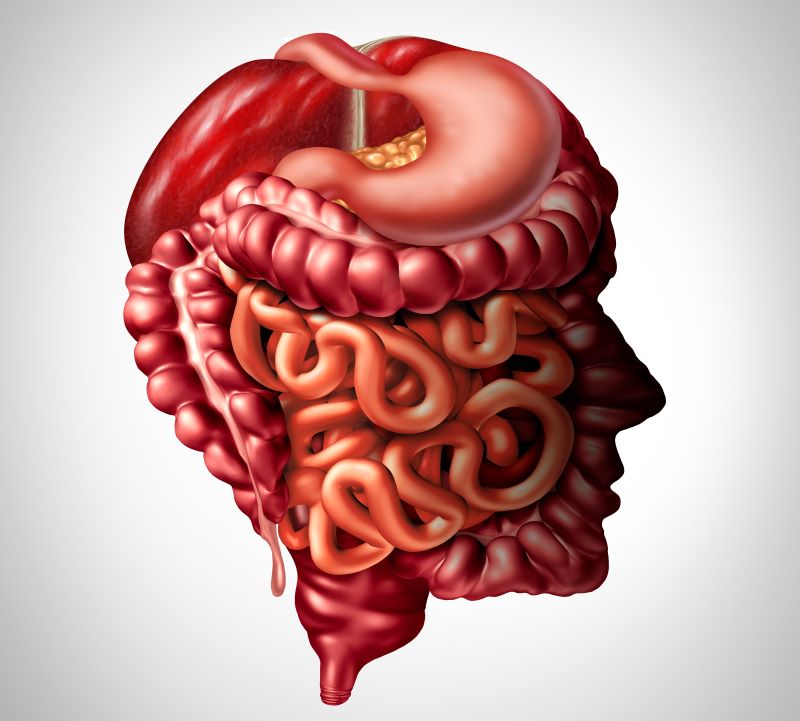Our bodies are complex systems where various organs and functions are intricately interconnected. One of the most fascinating connections gaining attention in recent years is the link between the gut and the brain. This connection, often referred to as the ‘gut-brain axis’, plays a crucial role in our overall well-being. In this blog, I’ll delve into the IBS gut-brain connection: the relationship between stress and irritable bowel syndrome (IBS).
The gut-brain axis: an overview
Our gut isn’t just a passive digestive tube. It houses a complex ecosystem of trillions of microbes, known as the gut microbiome, that play a crucial role in digestion, immunity and even mood. This intricate network of bacteria communicates constantly with our central nervous system (CNS) through a two-way highway called the gut-brain axis. Signals travel via nerves, hormones and immune messengers, creating a constant dialogue between our gut and brain.
How does this relate to IBS?
In IBS, this delicate communication can become disrupted. Here’s how:
- Oversensitive gut: People with IBS often have a hypersensitive digestive system. Normal movements or gas can trigger uncomfortable sensations that are amplified by the brain
- Stressful signals: Stress activates the sympathetic nervous system, which can trigger gut muscle contractions, leading to cramping, diarrhoea or constipation
- Microbiome imbalance: Research suggests that an imbalanced gut microbiome may contribute to IBS symptoms. When the beneficial bacteria are outnumbered by the not so beneficial, it can lead to irritation in the gut, sending distress signals to the brain
Stress and IBS flare-ups
Stress is a part of our fast-paced lives, but its effects on the body are far-reaching. When we experience stress, the ‘fight or flight’ response is activated, leading to the release of stress hormones. Whilst this response is essential for survival, chronic stress can have a major impact on the body, including the digestive system. The gut’s intricate network of nerves and neurotransmitters, often referred to as the ‘second brain’ is influenced by stress hormones like cortisol and adrenaline. These can affect gut motility, heighten gut sensitivity and even alter the microbiome. This can lead to the familiar symptoms of IBS: cramping, diarrhoea or constipation.
How does this gut-brain connection work?
The brain and the gut are in constant communication through the vagus nerve, a major nerve that extends from the brainstem to the abdomen. This nerve carries signals bidirectionally, meaning that the brain can affect the gut and vice versa. When stress signals are sent from the brain to the gut, they can disrupt normal digestive processes, leading to symptoms common in IBS.
Also, the gut is home a vast community of microorganisms known as the gut microbiome. These bacteria play a crucial role in digestion, immunity and even the production of neurotransmitters. Research shows that the gut microbiome influences mood, behaviour and the development of certain disease states, further evidence of the gut-brain connection.
Managing stress and IBS symptoms
Recognizing the profound impact of stress on IBS symptoms reveals some of the more holistic approaches to managing the condition. While stress is an inevitable part of life, there are strategies that individuals with IBS can use to mitigate its effects:
- Mindfulness and relaxation techniques: Try meditation, deep breathing and relaxation to help reduce stress levels and promote overall well-being. The ‘Rewiring your Brain‘ summits provide lots of interesting articles and ways to improve the way we approach life
- Regular physical activity: Engaging in regular exercise has been shown to have a positive effect on both gut health and stress reduction. Just a brisk walk in nature does wonders for body and soul
- Balanced diet: Eating a well-balanced diet rich in fibre, whole foods and probiotics can support gut health and indirectly contribute to stress reduction. For some this may need to be taken further by using the low FODMAP diet approach
- Counselling and therapy: Seeking professional support through counselling or therapy can provide effective tools for managing stress and its impact on IBS
Conclusion
The gut-brain connection underscores the importance of addressing the psychological aspects of IBS. By acknowledging the link between stress and gut health, you can be proactive in managing your symptoms and overall quality of life. The physiological aspects are also important. Identifying food triggers and reducing or eliminating them, can bring improved symptom management. However, whenever making any major changes to your diet, it’s always best to get some expert advice and support. So, use a two-pronged approach to improve the IBS gut-brain connection.
You’re not alone – a FODMAP Dietitian can help
If you need expert advice and support, an IBS Dietitian trained in FODMAPs can use knowledge and experience to help you with the low FODMAP diet. It can be difficult to do alone, but with support, sufferers can identify their triggers and improve management of IBS symptoms. A FODMAP dietitian will provide practical ways to help you fit the low FODMAP diet into your lifestyle. Ensuring that you still get all the nutrients you need from your food. I have a base in Cardiff and Bristol, but work across the UK via online sessions. So, why not arrange a call today.
Disclaimer: This blog is for information purposes only and does not substitute for professional medical advice. Please consult your healthcare provider for personalised diagnosis and treatment of IBS.




